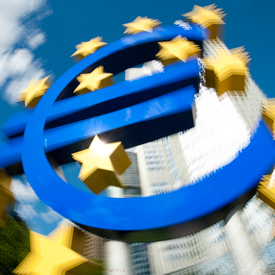Ratings agency warns of eurozone downgrade
Ratings agency Standard and Poor’s warns it is considering downgrading the euro bailout facility itself after suggesting similar moves for many eurozone countries amid the ongoing financial turmoil.

The ratings agency said that it is considering downgrading the European Financial Stability Facility, the euro bailout fund financed by member governments.
The warning follows its announcement on Monday that many eurozone nations were also at risk of downgrade – meaning they could lose their triple AAA credit rating.
Standard and Poor’s said stress in the eurozone, as a result of higher risk premiums on some countries, continuing political disagreement and a rising risk of recession, had prompted the move.
Monday’s warning means that six countries with the top AAA rating have a 50 per cent chance of their rating being downgraded, including France and Germany.
S&P said it would make a decision about the eurozone’s sovereign ratings as soon as possible following the EU summit scheduled for 8 and 9 December.
Markets and investors responded with surprise but not panic at the move – the FTSE 100 was slightly up just ahead of the afternoon close of the markets.
European crisis
The decision to reassess eurozone countries’ sovereign rating came on the day French President Nicolas Sarkozy and German Chancellor Angela Merkel agreed a series of reforms to impose tighter budget discipline across the eurozone.
Their proposals for a treaty change, which would include automatic sanctions for states who fail to meet the 3 per cent deficit rule, as well as a budget-balancing rule across the eurozone, will be presented to EU President Herman Van Rompuy on Wednesday 7 December.
Read more: France and Germany ‘want new Euro treaty’
Koji Fukaya, chief FX strategist at Credit Suisse, told Reuters that the move by S&P reflected concerns that policies intended to reduce debt will not be implemented.
“You can see that the EU leaders are trying to get their act together. But even if their plans are realised, it’s not going to improve their dire finances overnight. This is going to be a drawn-out process,” he said, adding that the euro will not easily get any serious respite.
“Italy and other countries have embarked on belt-tightening measures and that has already seen a positive reaction from the markets, but doubts about the implementation of these policies linger. The move by S&P partly reflects these worries.”
-
Latest news
-
Taylor Swift’s new break-up album breaks records3m

-
NHS trust fined £200K for failings that led to death of two mental health patients3m

-
Sunak vows to end UK ‘sick note culture’ with benefit reform3m

-
‘Loose talk about using nuclear weapons is irresponsible and unacceptable’, says head of UN’s nuclear watchdog3m

-
‘There wasn’t an Israeli attack on Iran,’ says former adviser to Iran’s nuclear negotiations team7m

-




